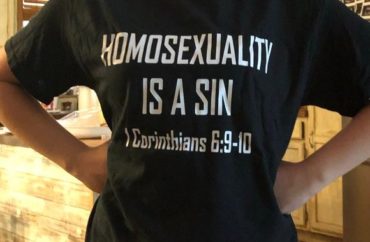
Appeals court protected ‘Be happy, not gay’ shirt in school
A student who was allegedly sent home for wearing a shirt stating “homosexuality is a sin” is now suing her Tennessee school district for violating her First Amendment rights and freedom of religion under state law.
She’s challenging the constitutionality of the Overton County Board of Education’s dress-code policy, both as written and applied to her, and seeking an injunction against its continued enforcement.
The federal lawsuit claims the teacher who sent her to the principal’s office on Aug. 25 had a pro-homosexuality symbol in the classroom. The principal allegedly told her it violated the dress code because her shirt was “sexually connotative.”
The principal called her parents to bring a change of clothes, but the student’s stepmother took her home instead, refusing to bring new clothes. As a result, Livingston Academy marked the student absent for the entire day.
“As interpreted an[d] applied, the School District’s Policy prohibits any message on clothing if somewhere within any other word the letters combine to [form] the word ‘sex,’” according to the suit.
The Oct. 16 filing does not name the girl because she’s a minor. She brought suit “by and through” her father, Richard Penkoski, against the district.
MORE: Public university bans student from proselytizing LGBT class
Kristin Fecteau Mosher, local counsel for Penkoski and his daughter, told The College Fix in an email Monday that they had not received a response from the school district 10 days later. (Other counsel are from the Florida-based American Liberties Institute.)
“[W]e just put the lawsuit in today’s mail to serve the Overton County BOE so they have not even seen it yet,” Mosher said. (The lawsuit was posted online and linked in two local TV reports Thursday, so the school district has likely seen it.)
“A lawsuit has been filed and we will go through the process to resolve it,” an unidentified representative of the Board of Education told The Fix in a phone call, declining to comment further.
An expert on First Amendment rights in public schools told The Fix that the federal court, which answers to the 6th U.S. Circuit Court of Appeals, has a variety of case law to consult on student speech and the context in which it’s used.
The 7th Circuit has previously ruled that “it violates the First Amendment to force a student to change out of a T-shirt with the message: ‘Be happy, not gay,’” Frank LoMonte, director of the University of Florida’s Brechner Center for Freedom of Information and longtime head of the Student Press Law Center, wrote in an email Tuesday.
“These school-speech cases always boil down to what level of disruption the school can show that the speech has provoked, or realistically will provoke,” he continued. If a student wore a shirt with a Confederate flag and it caused a fight on school grounds, the school can ban it “even if the wearer had no intent to incite violence.”
MORE: Pro-LGBT statements OK on high school shirts, but not anti-LGBT statements
‘If you ain’t a hoe’ display allowed
“B.A.P.,” as the girl is identified in the lawsuit, is suing for violation of freedom of speech and free exercise of religion, due process and equal protection under the First, Fifth and Fourteenth amendments. She’s also asserting violations of Tennessee’s Religious Freedom Restoration Act.
The lawsuit says the student did not encourage harm or violence to anyone in expressing her political opinions. She wants to continue to express her beliefs “without being marked as absent, expelled, demerited, or suspended.” (The suit doesn’t give her age, but her father tweeted that she’s 15.)
Principal Richard Melton told Penkoski that his daughter’s shirt had a sexual connotation because of the word “sex” in homosexuality, making it inappropriate for school.
Livingston Academy is not necessarily squeamish about sexual matters in general, though. The suit claims that in the past year, students wore a “Virginity Rocks” shirt and shoes with a pro-homosexuality symbol and didn’t get punished.
Political or crude expression has similarly not resulted in discipline for other students, according to the student. One of her peers wore a face covering with a gun pattern and another displayed a message during Spanish class that said “And if you ain’t a hoe, get up out my trap house” (a place where illicit drugs are sold).
The word “sex” is not prohibited from being spoken in the school district during class or a “non-class time casual setting,” the suit claims.
Just a week before the suit was filed, the teacher who sent her to the principal’s office, Stephen Henson, was conversing with another teacher, Lauren Wood, and a student. “I’m pretty sure they were having sex,” the student reportedly said, drawing laughs from the teachers.
MORE: Appeals court rules schools can’t punish off-campus speech
https://twitter.com/WFCChurch/status/1298504381432762374
Did gay students see shirt as ‘portending violence against them’?
The district’s policies and actions violated the student’s constitutional rights because they “allow for the exercise of unbridled discretion,” are too vague, “lack narrow tailoring” and deny freedom of speech with “no rational, substantial, or compelling government interest,” the suit claims.
Violating both the First Amendment and Tennessee law, the school forced her to choose between her education and her religion, which tells her she must spread the Gospel. Her shirt cited First Corinthians 6:9-10, which says “men who have sex with men … will [not] inherit the kingdom of God.”
Policy, procedures, employee training and enforcement “lack sufficient objective standards” and give too much discretion to school officials, who can enforce it in a discriminatory way, according to the suit.
She’s seeking both nominal and compensatory damages for “mental and emotional distress, impairment of reputation, personal humiliation, and other tangible and intangible harm” caused her by the school’s mistreatment and policies. (Nominal damages are at issue in another school-speech case the Supreme Court is scheduled to hear early next year.)
The district will be able to defend its actions if officials can show the shirt’s message “goes beyond merely arousing strong political disagreements” or “was seen by LGBT students as portending violence against them,” LoMonte said.
He mentioned the 9th Circuit’s narrow application of the Supreme Court’s definitive ruling on student speech on school grounds, known as Tinker. In 2015 the Supreme Court declined to review that ruling, known as Dariano.
“[T]he federal courts decided that even a shirt with as harmless and benign of an image as the United States flag could be banned if there was concrete evidence that students were using the image to taunt nonwhite students during a celebration of Latino pride,” according to LoMonte.
MORE: SCOTUS declines to review American flag ban at school
IMAGE: Rich Penkoski/Twitter
Like The College Fix on Facebook / Follow us on Twitter






Please join the conversation about our stories on Facebook, Twitter, Instagram, Reddit, MeWe, Rumble, Gab, Minds and Gettr.